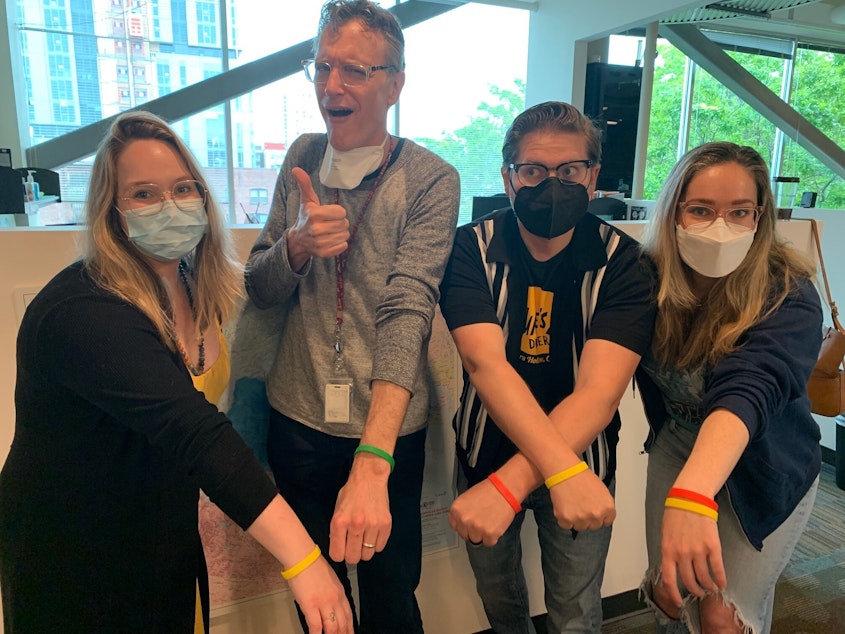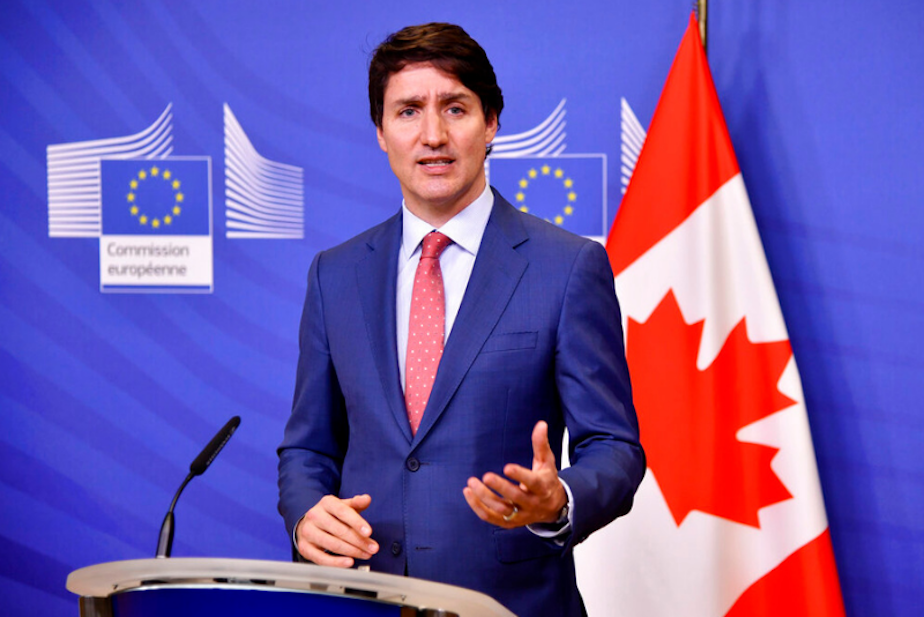Pandemic goes red, yellow, and green: Today So Far

The latest phase of the ongoing pandemic is red, yellow, and green — depending on your social comfort level. Have you noticed any color-coded wristbands around?
Also:
- More and more Washington drivers are not pulling over for police during traffic stops.
- Local audiences may recognize their Northwest backyard in "Top Gun: Maverick."
This post originally appeared in KUOW's Today So Far newsletter for May 31, 2022.
A Redmond police officer turned on their patrol lights last March in an attempt to pull over a driver. Instead of pulling over for the traffic stop, the driver called 911. He told the dispatcher that he was driving with a suspended license and he wasn't stopping.
“I’m driving suspended; he’s not going to get me," the 911 recording states. "It’s a violation of 1054. He’s not allowed to chase me. You need to tell them to call it off.”
The driver referenced House Bill 1054, which was passed alongside a series of police reforms over the past two years. It states that police cannot chase drivers, except in certain situations that require a high standard of probable cause — basically, they have to be dangerous, like an escaped felon or someone accused of a violent crime. According to Washington law enforcement officials, word is out about HB 1054, and the Redmond driver is not an anomaly. A lot of drivers aren't stopping.
Northwest News Network's Austin Jenkins reports that between January and May of this year, the Washington State Patrol logged 934 failure-to-yield incidents (drivers not pulling over for a traffic stop). The Puyallup Police Department has recorded 148 instances between July 26, 2021 to May 18, 2022. Police departments didn't track such failures to yield in the past, because they were so unusual. Now, it's happening daily. Read the full story here.
Speaking of yielding, how comfortable are you with others now that pandemic precautions are fading away? When KUOW staff started returning to the office, the higher ups gave us all a welcome back package that included three wristbands — red, yellow, green. The idea: instead of trying to guess each individual's comfort level, you can spot their wristband. Green means it's all good and you're OK with a hug. Yellow means you're still cautious, keeping some distance and being careful. And red implies "back off and let me do my thing."
Personally, before there was a global pandemic and any need for color-coded social interactions, I was basically a red band anyway. But I realize that my socially awkward personality isn't apt for an office, so these days I wear a yellow on one wrist and a red on the other. I just emphasize whichever wrist fits the situation. I do the same at comicons, which are also using this wristband system.
But some folks might perceive my red/yellow display as being rude, even in Seattle. This is the sort of conversation I had with a few of my KUOW colleagues on Bill Radke's new podcast, "Subtext." It covers the things we often leave unsaid, or are afraid to openly talk about. And there is a lot of that happening as we emerge from all our pandemic precautions (even as a considerable Covid wave is currently striking our region). Do you talk about your comfort level with friends and family? Do you need a wristband? There's a lot more discussed, so give today's "Subtext" a listen.
Turns out, the highway to the danger zone passes through the Pacific Northwest. "Top Gun: Maverick" was just released into theaters — a sequel that comes 36 years after the first film. While it retains its main star, Tom Cruise, audiences will also get to enjoy a Northwest star too ... the Northwest. Washington's scenic Cascade Mountains and other regional landscapes are the backdrop to much of the film's impressive aerial shots. Some of Top Gun's production was based out of the naval air station on Whidbey Island. Jets took Cruise and other actors on flights that are common training paths in our region. In the film, they serve as the topography of an unnamed rogue state. Read the full story here.
AS SEEN ON KUOW

KUOW's Katie Campbell, Bill Radke, Dyer Oxley, and Libby Denkmann show off their wrist bands — worn around the KUOW office to show individual comfort levels as people navigate current pandemic social settings. (KUOW)
DID YOU KNOW?
"Top Gun: Maverick" is currently showing on big screens, 36 years after the first film debuted. It's hard to think of that first film without the music of Kenny Loggins entering your mind. Loggins' career goes back to the 1970s, but I'd argue that he largely wrote the soundtrack to the '80s with songs for both "Caddyshack" films, "Footloose," "Over The Top," and "Top Gun."
While Loggins found success in Hollywood, his origins are in Everett, Wash. He was born in Everett and spent his younger years there before his family moved to Seattle and eventually California.
ALSO ON OUR MINDS

Canada's government moves to make selling or importing handguns illegal
Canadian Prime Minister Justin Trudeau's government introduced legislation Monday that would put a freeze on importing, buying or selling handguns. Canada already has plans to ban 1,500 types of military-style firearms and offer a mandatory buyback program that will begin at the end of the year. It already expanded background checks.

